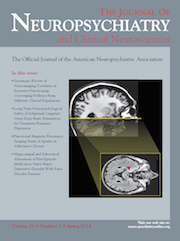Post-ECT Hyperthermia and Rapid Mood Improvements: a Case Report
To the Editor: ECT is a safe and effective treatment for refractory major depression. Common side effects of ECT include headache, nausea, and mild memory impairment.1 ECT-associated hyperthermia has been rarely described.2,3
We report a case of repeated post-ECT hyperthermia associated with rapid, transient mood improvements in a patient with drug-resistant depression.
Case Report
Mr. A, aged 26, was admitted to a tertiary-care psychiatric hospital with a major depressive episode resistant to mirtazapine, fluvoxamine, bupropion, and sertraline. The patient's medical history was unremarkable. Neurologic and neuroimaging examination revealed no abnormalities and Mr. A was qualified to bitemporal ECT with a standard anesthetic protocol (atropine, thiopental, succinylcholine). Twelve ECT sessions were performed biweekly, between 9:00 a.m. and 11:00 a.m., with the aid of the Thymatron apparatus. Two hours after the first session, the patient complained of flu-like symptoms, including headache and fever. A rise in his body temperature exceeding 2°C (up to 38.8°C) was documented by tympanic membrane and oral temperature measurements. In the afternoon, a marked improvement in mood and drive was reported by the patient and confirmed by an on-duty psychiatrist. In the evening, Mr. A felt a reduction in flu-like symptoms and 24 hours after ECT his mood and body temperature returned to baseline levels.
A close correlation between post-ECT hyperthermia and transient improvements in depressive symptomatology was observed in sessions 1–7. When post-ECT hyperthermia was absent (session 2 and 4), no improvement or transient worsening in mental state was noted on the same day. A significant rise in body temperature (∆T>1°C) after sessions 1, 3, 5, and 7 was associated with rapid, transient mood improvements. Repeated physical and laboratory examinations showed no abnormalities. There was no relationship between the ECT-associated rise in body temperature and seizure duration or the course of anesthesia.
Post-ECT hyperthermia was not observed beyond session 7. ECT sessions 8–12 resulted in a stable improvement in depressive symptomatology.
Discussion
To the best of our knowledge, this is the first report on post-ECT hyperthermia associated with rapid, transient mood improvements in an adult patient with drug-resistant depression. One may hypothesize that post-ECT hyperthermia may be a correlate of successful stimulation of brain structures (e.g., the hypothalamus) involved in mood and thermal homeostasis.1,4,5 More detailed studies are needed to quantify post-ECT alterations in brain and body temperature and their relationship to short- and long-term clinical outcomes.
1 : What we have learned about electroconvulsive therapy and its relevance for the practicing psychiatrist. Can J Psychiatry 2011; 56:5–12Crossref, Medline, Google Scholar
2 : Fever following electroshock. Am J Psychiatry 1962; 118:946–947Crossref, Medline, Google Scholar
3 : Febrile reaction with elevated CPK after a single electroconvulsive therapy (ECT) in an adolescent patient with severe bipolar disorder. J ECT 2012; 28:70–71Crossref, Medline, Google Scholar
4 : Brain temperature may influence mood: a hypothesis. Med Hypotheses 2008; 70:497–500Crossref, Medline, Google Scholar
5 Bolwig TG: How does electroconvulsive therapy work? Theories on its mechanism.Google Scholar



